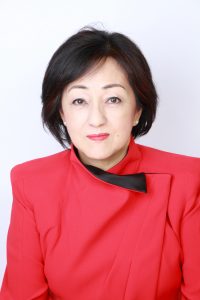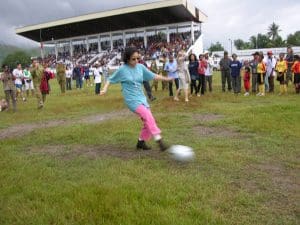Peacebuilding with Emotional Intelligence. Member Spotlight: Michiko Kuroda
Fulfilling her impossible dream of working on a global scale, Michiko Kuroda has worked at the United Nations for over 30 years. Growing up in Tokyo, she had a strong desire to explore beyond the shores of Japan, the land of the rising sun. She distinctly remembers the immense feeling she first had when reading over a UN resolution when she started shivering from excitement, and she still feels the same way today. Michiko moved to Europe and started studying in French at the University of Louvain, Louvain-la Neuve in Belgium, as well as the Graduate Institute of International Studies in Geneva, Switzerland. By 1980, she joined the UN International Labour Organization in Geneva, Switzerland. She began her career by working in human rights and international law and moved to other areas. She eventually made the move to New York in 1992. After settling into her new life in the USA, she started taking courses in non-violent communication and mediation and became a community mediator in New York City.
Peacekeeping in Action in East Timor
 In 2004, she went on a UN Peacekeeping Mission in Timor-Leste where she applied her mediation skills as Chief of Staff. One of the proudest moments of her career was her contribution to preventing further violent conflict in Timor-Leste. At that time, she did not know anything about emotional intelligence “I just did my best and made sure to talk to all the stakeholders and parties that were involved in the conflict.” This mission prioritized talking to members of churches, various community groups, and any other members of the community they could reach. By holding inclusive consultations, they were able to find ways to prevent further conflict. This practice was part of the “Good Offices” of the UN function at that time. She explained that“I was committed to preventing conflict, that was so strong, and I was not ready to leave unless I did that. Commitment is really important because, with commitment, we can really achieve everything. If we are committed, we will find a way.”
In 2004, she went on a UN Peacekeeping Mission in Timor-Leste where she applied her mediation skills as Chief of Staff. One of the proudest moments of her career was her contribution to preventing further violent conflict in Timor-Leste. At that time, she did not know anything about emotional intelligence “I just did my best and made sure to talk to all the stakeholders and parties that were involved in the conflict.” This mission prioritized talking to members of churches, various community groups, and any other members of the community they could reach. By holding inclusive consultations, they were able to find ways to prevent further conflict. This practice was part of the “Good Offices” of the UN function at that time. She explained that“I was committed to preventing conflict, that was so strong, and I was not ready to leave unless I did that. Commitment is really important because, with commitment, we can really achieve everything. If we are committed, we will find a way.”
They conducted an analysis of the conflict of what happened, and she identified the root causes of the conflict. There was a lack of good governance and a significant lack of security. She noticed that the people were feeling insecure “This was because the people saw the president every week because he gave weekly speeches. They loved him, but after this violence, they didn’t see him any longer. When people are insecure, there is a risk that they might take strong or negative action, so taking care of people’s feelings is essential. We try to address the feeling, that is why we talked to everyone. Years later, after studying emotional intelligence, she realized that she had been using it all along. “I did not think about it at that time, but if I analyze this now, I was using Emotional Intelligence.” This experience is what she is most proud of.
Mediation and Coaching
 As part of her mission statement, she sees herself as a medium for peacebuilders in search of love and justice. She followed through even when people were against her and discouraged her from pursuing her dreams. Over time, she met individuals who advised and encouraged her, which lead her to finding many opportunities to open doors that were once locked. She now teaches to become that support system she did not have, helping young people gain mediation and peacebuilding skills to grow as peacebuilders. “I want to help people become peacebuilders so I am helping them in that process!” she stated happily.
As part of her mission statement, she sees herself as a medium for peacebuilders in search of love and justice. She followed through even when people were against her and discouraged her from pursuing her dreams. Over time, she met individuals who advised and encouraged her, which lead her to finding many opportunities to open doors that were once locked. She now teaches to become that support system she did not have, helping young people gain mediation and peacebuilding skills to grow as peacebuilders. “I want to help people become peacebuilders so I am helping them in that process!” she stated happily.
From her experiences, she understands the value and importance of including emotional intelligence within peace operations and views it as an asset for making her students more effective peacebuilders. She became a certified coach and does conflict coaching in addition to transformational and executive coaching. Michiko explained how mediation and coaching skills complement each other, “I think overall my coaching experiences helped me a lot. I look at the world in a different way. Coaching is something that mediators may want to learn also, although they may look similar, they are different aspects.”
Michiko retired from the UN and is evaluating what to pursue next. Currently, as a UN peacebuilding advisor and coach, she teaches and coaches in New York. She is a Coach for the UN and UN agencies, and for Humanitarian Coach Network where she coaches people who are working in humanitarian work. She joined MBBI with hopes of going back to the field again to do mediation work. When she goes to the field again, she wants to help by applying emotional intelligence into conflict resolution and mediation practices. She looks forward to giving a workshop or webinar on emotional intelligence in the future. Her newest “impossible dream” is to work with and empower the head of missions of INGOs and NGOs with emotional intelligence.
Article by Kylea Shropshire, MBBI Writer
